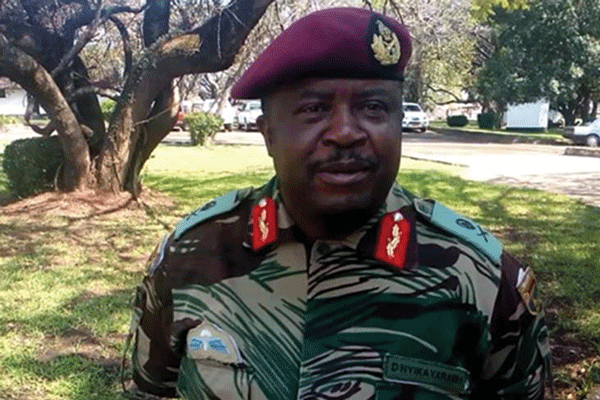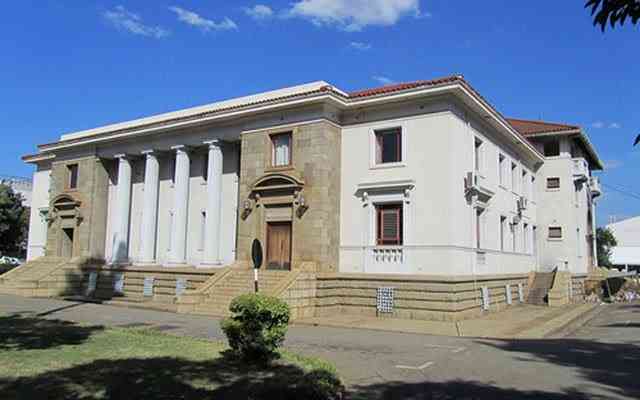
BY Everson Mushava
The military yesterday alleged that protesters broke into police armouries and stole guns which they used to kill citizens, including a police officer, during last month’s national shutdown that turned violent.
Addressing journalists in Harare yesterday, Zimbabwe Defence Forces (ZDF) Chief of Staff, Major-General Douglas Nyikayaramba distanced the military from the shootings. He, however, justified the heavy handedness by the military, arguing that the ZDF’s response was proportionate to the level of violence and damage caused by the protesters.
The army general said police investigations have shown that the protesters and deserters from the military were responsible for the killings.
Nyikayaramba said about 165 shops owned by ordinary citizens were looted, warranting the military intervention after police sought reinforcements.
He said the soldiers would remain deployed on the streets until the situation was under control.
“Protesters destroyed about 165 shops owned by ordinary members of the public,” Nyikayaramba said.
“They overran police stations, burnt police and public transport vehicles and also killed citizens including a police officer. They broke into police armouries, stealing weapons and ammunition, which they used to kill people.
- Chamisa under fire over US$120K donation
- Mavhunga puts DeMbare into Chibuku quarterfinals
- Pension funds bet on Cabora Bassa oilfields
- Councils defy govt fire tender directive
Keep Reading
“Had the military not come in support of the Zimbabwe Republic Police, one wonders whether the whole country would not have been looted that day. ZDF, however, regrets the loss of life which followed the unnecessary disturbances.”
Asked how he had arrived at that conclusion, Nyikayaramba said: “Police investigations have shown that.”
Human rights organisations say 17 people died during the military crackdown following the three-day national shutdown called by the Zimbabwe Congress of Trade Unions and social movements Tajamuka and #ThisFlag.
According to a Human Rights NGO Forum report, over 1 700 people were assaulted by the military, 81 people had gunshot wounds, while 16 women were allegedly raped.
The crackdown is still ongoing, with the military conducting night raids and beating up people.
Soldiers are also a common sight at police roadblocks, while they have also pitched up bases at police stations. More cases of assault are still being reported.
“Following the deployment of the ZDF, there have been a number of serious allegations levelled against us, including human rights abuses, rape, assaults, extortion and others,” Nyikayaramba said.
“It is important to state that the ZDF’s response was commensurate to the level of violence and damage caused by the protesters.”
He urged people whose rights had been violated, including rape, which he described as uncouth, to report to the police, saying fair investigations would be conducted, including parades to identify perpetrators if need be.
“Soldiers were deployed to patrol the streets and if there are soldiers who could have acted over board, investigations will be conducted,” he said.
The military, Nyikayaramba said, places discipline at the centre of its conduct and anyone caught on the wrong side would be disciplined.
The army boss also claimed that acts of abuse could have been perpetrated by deserters who fled with army uniforms, which he said they now used to perpetrate criminal activities.
“We have been flashing out rogue elements and we have a challenge that some of them ran away with our uniforms. Some of the uniforms are stolen on washing lines, which other people use to perpetrate criminal activities,” he said.
“Some of the uniforms are taken from deceased people. We have not been collecting them and it’s a weakness in the system. We urge all those with the uniforms to return them. Some have started returning them and there is a heap in Epworth from people surrendering them.”
Nyikayaramba said the country was not under insurgency, but was under attack from criminal elements using military uniforms.
“There is no terrorism in Zimbabwe. There is no insurgency. It is only the acts of those criminal elements,” he said.
There have been speculation that some military personnel were involved in the violence that occurred during the crackdown to destabilise government and overthrow President Emmerson Mnangagwa due to the rifts in the ruling party.







